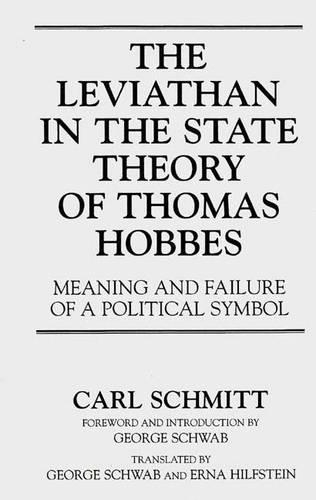
The Leviathan in the State Theory of Thomas Hobbes: Meaning and Failure of a Political Symbol
(Hardback)
Publishing Details
The Leviathan in the State Theory of Thomas Hobbes: Meaning and Failure of a Political Symbol
By (Author) George Schwab
Bloomsbury Publishing PLC
Praeger Publishers Inc
24th September 1996
United States
Classifications
Tertiary Education
Non Fiction
320.1
Physical Properties
Hardback
160
Width 140mm, Height 210mm
312g
Description
Carl Schmitt, the Thomas Hobbes of the 20th century, joined the Nazi Party in 1933 and aspired to become the crown jurist and political philosopher of the Third Reich. But, because of his anti-Nazi past, friendships wih Jews and Marxists, and contempt for biological racism, Schmitt was severely attacked by the SS in 1936 and warned to stop posing as a National Socialist thinker. Fearful of what this might imply in the rapidly evolving one-party SS state, Schmitt began to distance himself from his National Socialist adventure - even tempered his recently acquired anti-Semitism - and carefully started to reconnect himself in 1937 and 1938 to the pre-1933 Schmitt. Writing in 1938 under the pretext of studying the significance of the symbol of the leviathan in Hobbes's theory of state, Schmitt alluded to the demise of the Third Reich because of its rapid transformation into a totalitarian polity. As Schmitt recognised, in this state, the Hobbesian protection-obedience axiom was being heavily tilted in favour of obedience at the expense of protection. When this occurred, Schmitt observed, "the soul of a people ...betakes itself on the 'secret road' that leads inward. Then grows the counterforce of silence and stillness", and "Public power and force may be ever so completely and emphatically recognised and ever so loyally respected, but only as a public and only an external power, it is hollow and already dead from within". Schmitt survived the fall of the Third Reich, and in the postwar years came to be recognised as one of the most significant political philosophers of the century. This is the first translation available of this important work which should be of value to scholars and students of modern political philosophy, legal theory and the history of Weimar and Nazi Germany.
Reviews
Fortunately, the English translation of this work is truthful to the German original and permits the critical reader to understand Schmitt . . . the way he understood himself. * The New York Review of Books *
Author Bio
George Schwab is professor of history at the City University of New York (Graduate Center and City College). President of the National Committee on American Foreign Policy, Dr. Schwab is a recipient of numerous grants and is the author, editor, and translator of works on great power rivalry, legal and political theory, and German history. His The Challenge of the Exception (2nd ed., Greenwood Press, 1989) was the first book of Schmitt's ideas to appear in English. Erna Hilfstein received her PhD in the history of science and has taught mathematics and science for many years in the New York City public school system.
